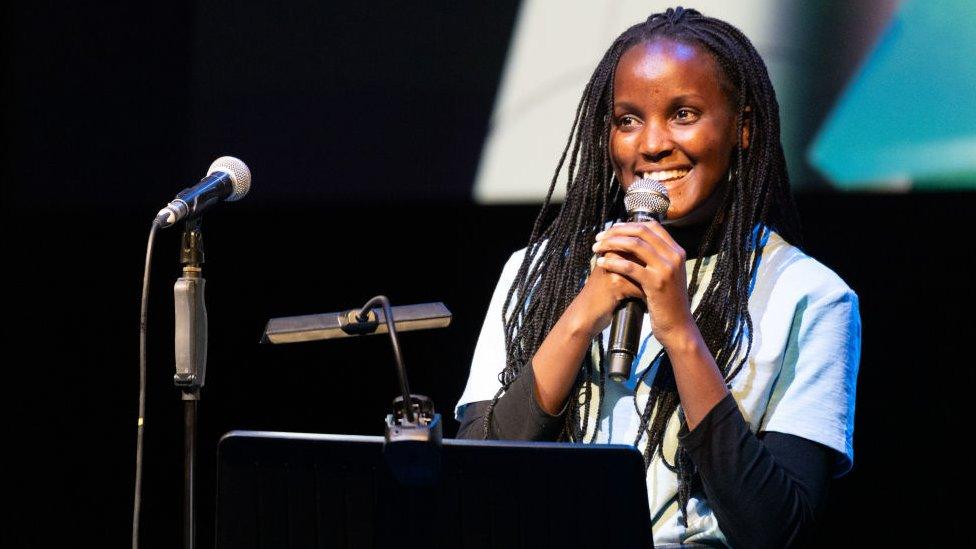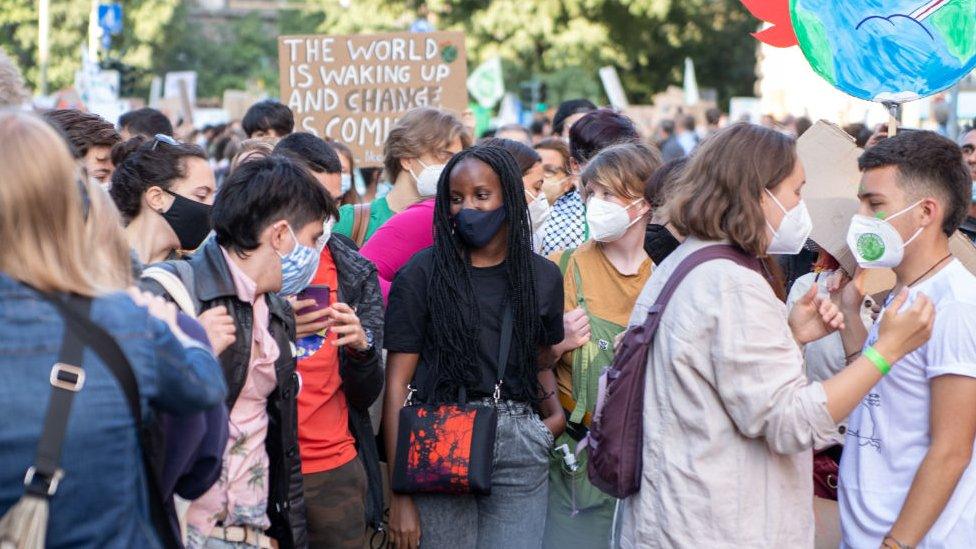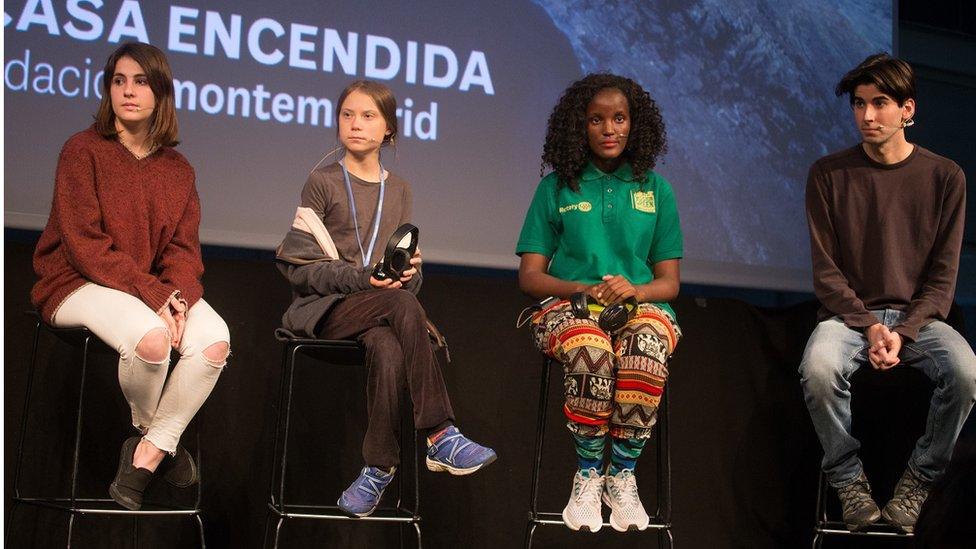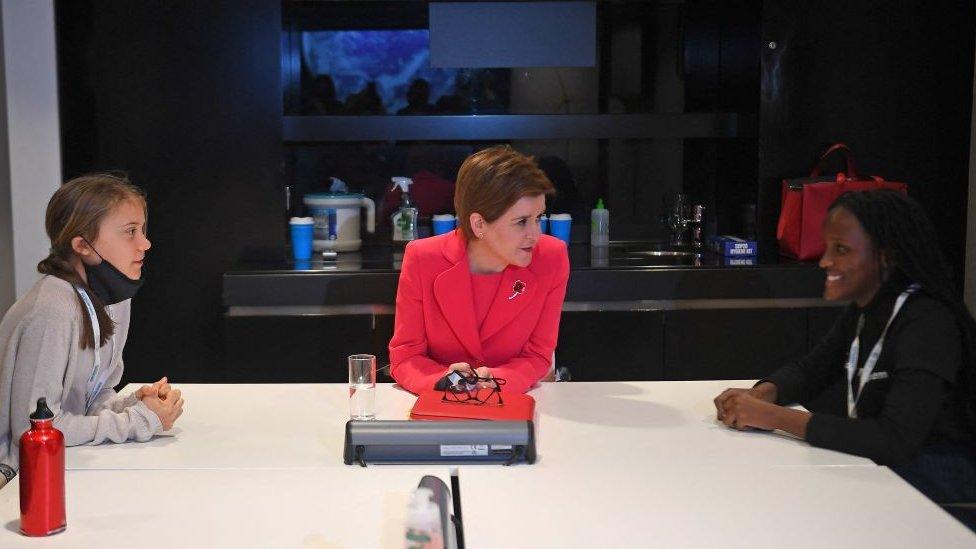Who is the Ugandan climate activist Vanessa Nakate?
- Published

Vanessa Nakate spoke to delegates at COP26 earlier this week.
You may have heard of Vanessa Nakate, but what does she stand for, where did she become interested in climate activism and why did a photograph anger her in 2019?
Who is Vanessa Nakete?
Vanessa was born in Uganda and is 24 years old. She lives in Kampala, the country's capital and largest city.
Vanessa said she began reading about the struggles people in her community faced in 2018.
"I realised that the climate crisis was just one of those challenges. It was the greatest threat facing the lives of the people", she realised.
"It really surprised me because this is not something I heard about in school. And yet the impacts that I was finding out about, I had already seen unfolding in my country but I couldn't make the connection to the climate crisis."
Vanessa's home country of Uganda is a landlocked nation in east Africa. The Equator Line runs through the country making it one of the hottest places on Earth.
A large proportion of the country is covered in lakes and rainforest and is home to a huge number of species, including mammals, trees, plants and insects.

Vanessa is often seen at climate marches and making powerful speeches to fellow activists.
With this heat comes extreme weather conditions that can lead to drought or heavy rainfall.
Vanessa had witnessed the effects of these natural disasters throughout her life with farming becoming more difficult, and heavy rain causing devastation to communities.
African nations are responsible for just 3% of global emissions but are disproportionately affected by the devastating effects of climate change.
She decided she needed to take action.
"It was like I wasn't even there."

Vanessa spoke out on climate change alongside teen activists Shari Crepi (Fridays for Future Spain), Greta Thunberg and Alejandro Martinez (Fridays for Future International Spain)
In January 2019, and inspired by Sweden's Greta Thunberg, Vanessa began her own strike in front of the Ugandan parliament building, demanding they take action over the climate crisis.
For a while, she protested alone, but after a few months, Vanessa began attracting the attention of the media, other activists and politicians all over the world.
Less than a year later, Vanessa was invited to Madrid to speak at COP25 - the huge climate conference.
A few weeks later, she attended the World Economic Forum in Davos, Switzerland and called on companies, banks and governments to immediately stop putting money into the use of fossil fuels as an energy source.
Here, she was angered by a media company for cropping her out of pictures which featured other youth climate activists.
"When I saw the photo, I only saw part of my jacket. I was not on the list of participants. None of my comments from the press conference were included," she said. "It was like I wasn't even there."
She said cropping her out of the pictures was a racist gesture, and did not accept an apology from the outlet responsible.
Racism is when someone behaves differently towards another person based on the colour of their skin or culture.
This means treating someone badly because they look different, speak a different language or wear their clothes or hair a certain way because of their religious beliefs or cultural traditions.
However, she said she was glad the incident had given more attention to African activists and the messages they were hoping to spread.
"As much as this incident has hurt me personally... maybe media will start paying attention to us not just when we're the victims of climate tragedies."

Greta Thunberg and Vanessa Nakate speaking to Scotland's First minister Nicola Sturgeon at COP26. Vanessa and Greta have since become friends and are often seen together on marches and protests.
She has since met with more world leaders, climate activists and even famous actors about this subject.
In July 2020 Vanessa was interviewed by Hollywood star Angelina Jolie about the power of African voices in discussions about climate.
She has founded two youth organisations, including the Rise Up movement - an organisation raising the profile of climate activists in Africa and around the world.
She has also been the leader in a big campaign to save Congo's rainforest, which is facing massive deforestation.
